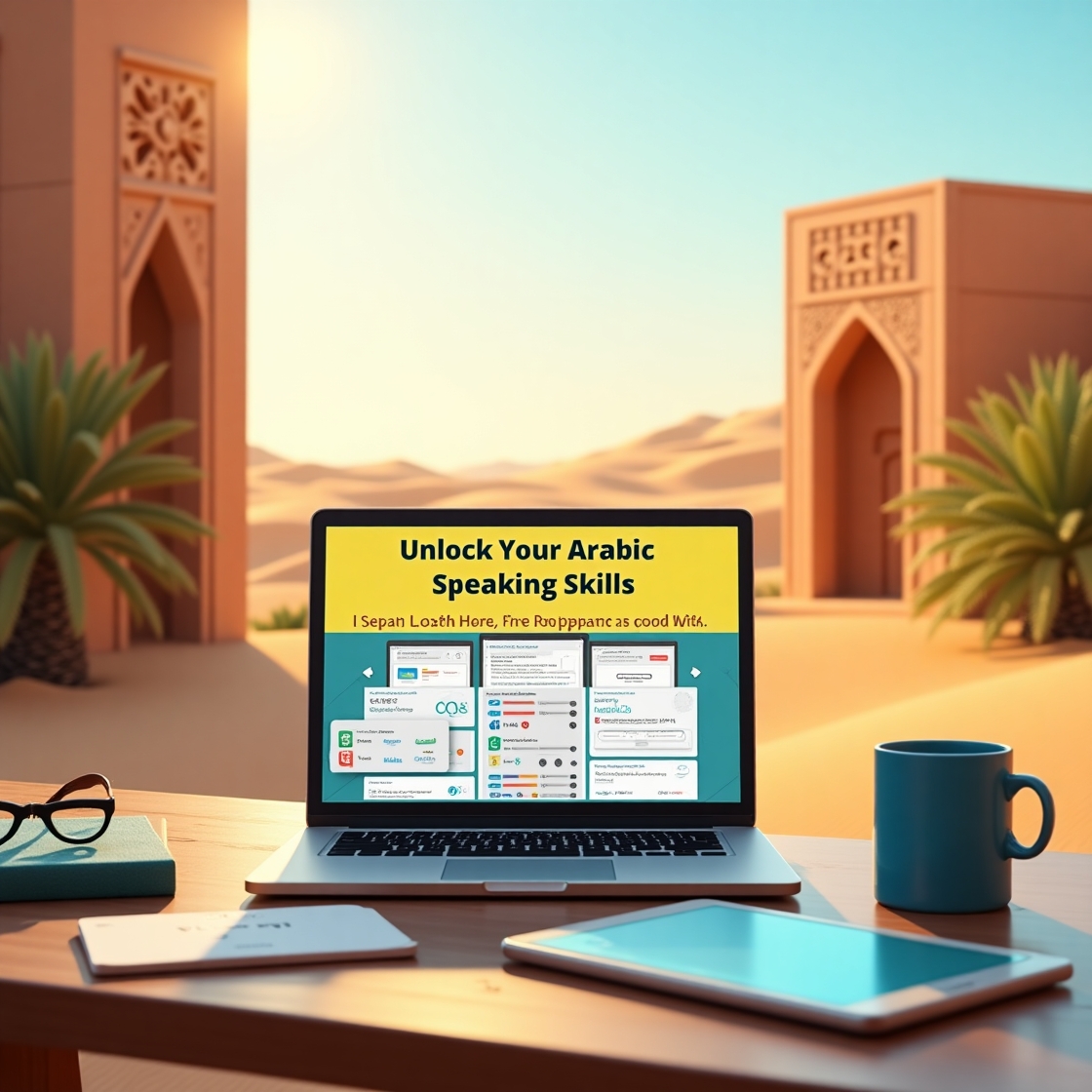Unlock Your Arabic Speaking Skills With These Online Power Moves

Learning Arabic can be one of the most rewarding decisions you ever make. Whether you’re a student of Islamic knowledge, a global traveler, a diplomat, a business professional, or simply passionate about languages, Arabic speaking skills open up a world of connection, culture, and career opportunities. But for many learners, speaking confidently in Arabic is the hardest skill to master.
The good news? With the right strategies and the best online tools, you can unlock your Arabic speaking skills faster than you ever imagined. In this blog post, we’ll show you powerful online techniques that are transforming Arabic language learning today — and how you can use them to supercharge your progress.
Let’s dive in!
Why Are Arabic Speaking Skills So Important?
While reading and writing are crucial, speaking Arabic fluently is what truly brings the language to life. When you can express yourself confidently in real-time conversations, you:
-
Connect more deeply with native speakers.
-
Understand the cultural context of words and phrases.
-
Sharpen your listening and comprehension.
-
Retain vocabulary better through active use.
-
Build confidence for real-world scenarios — from daily conversations to professional settings.
Whether you’re studying Modern Standard Arabic (MSA), dialects like Egyptian or Levantine, or Classical Arabic for Islamic studies, Arabic speaking skills are the key to fluency and understanding.
The Online Advantage: How Digital Learning Can Boost Your Speaking Skills
Online learning has revolutionized how we acquire languages. When it comes to Arabic speaking skills, the internet gives you access to native teachers, flexible lessons, authentic conversations, and a wealth of multimedia tools — all from the comfort of your home.
Here are just a few of the power moves you can make with online Arabic learning:
1. One-on-One Lessons with Native Teachers
One of the most effective ways to develop Arabic speaking skills is through live conversation with a native speaker. Private online lessons give you the chance to:
-
Practice real-life dialogue.
-
Get instant feedback on your pronunciation and grammar.
-
Learn cultural expressions and local slang.
-
Speak Arabic regularly — which is essential for fluency.
At Al Arabiya Institute, you can book one-on-one lessons with professional native Arabic teachers. Whether you’re a beginner or advanced learner, the personalized attention ensures you grow your speaking skills consistently. Plus, they offer the best prices and a free trial lesson, so you can test the waters before committing.
2. Join Speaking Clubs or Language Exchanges
To truly unlock your Arabic speaking skills, you need regular speaking practice — ideally with real people.
Look for online speaking clubs or Arabic language exchange groups, where learners pair up to practice conversations. These sessions simulate real-life scenarios and allow you to learn informal expressions that you won’t find in textbooks.
Tip: Combine these exchanges with structured lessons from a platform like Al Arabiya Institute, so you build both fluency and accuracy in your speech.
3. Record Yourself Speaking
A powerful but often overlooked technique: record your Arabic speech regularly.
Use tools like your phone or a voice recording app to:
-
Read aloud Arabic texts.
-
Practice speaking spontaneously about a topic.
-
Repeat after native audio recordings.
Then, listen to your own recording and compare it to native speech. This method helps you self-correct, improve pronunciation, and track your progress over time.
4. Immerse Yourself in Arabic Media — Actively
Watching Arabic shows or listening to Arabic podcasts is great for exposure, but to boost your Arabic speaking skills, you must engage actively.
Here’s how:
-
Pause and repeat phrases aloud.
-
Mimic intonation and pronunciation.
-
Write down and say new vocabulary words out loud.
-
Practice summarizing what you heard — in Arabic.
Platforms like YouTube and audio libraries from Al Arabiya Institute offer excellent authentic content tailored for learners.
5. Shadowing Native Speakers
Shadowing is a pro technique used by polyglots. You listen to a native speaker and try to speak at the same time, mimicking rhythm, tone, and pronunciation.
Start with slower speech (children’s stories or beginner podcasts), then progress to news reports or interviews.
Shadowing improves fluency, reduces hesitation, and builds the muscle memory needed for smooth Arabic speech.
6. Learn High-Frequency Phrases
You don’t need to memorize a dictionary to speak Arabic. Focus on high-frequency phrases that come up in everyday conversation:
-
كيف حالك؟ (How are you?)
-
ما رأيك؟ (What do you think?)
-
هل يمكنك أن تعيد؟ (Can you repeat?)
-
أعتقد أن… (I think that…)
Learn these core phrases with correct pronunciation and usage. Then, build on them with topic-specific vocabulary.
The structured online Arabic courses at Al Arabiya Institute are designed to teach these essential speaking patterns through repetition, context, and real-life usage.
7. Use AI and Language Apps — Wisely
Language apps like Anki, Memrise, and even AI-powered chat tools can help you practice Arabic vocabulary and simulate basic conversations. But to truly develop Arabic speaking skills, they should be a supplement — not a replacement — for human interaction and expert guidance.
Apps can boost vocabulary, but live speaking with a qualified teacher, like those at Al Arabiya Institute, is what truly builds fluency.
8. Don’t Fear Mistakes — Use Them
Many learners stay silent because they’re afraid of making mistakes. But here’s the truth: Mistakes are essential to mastering Arabic speaking skills.
Each time you speak, even if it’s not perfect, you’re improving. Mistakes give your teacher something to correct, and every correction brings you one step closer to fluency.
Al Arabiya Institute’s teachers are patient, experienced, and supportive — creating a safe space to make errors, ask questions, and grow in confidence.
9. Set Clear Speaking Goals
To stay motivated and focused, set clear speaking goals each week:
-
“I’ll hold a 5-minute conversation about my daily routine.”
-
“I’ll learn 10 new verbs and use them in sentences.”
-
“I’ll practice introducing myself and asking basic questions.”
Break these into daily mini-goals. Track your progress using journals, videos, or voice notes. And share them with your tutor at Al Arabiya Institute, who can guide you along the way.
10. Consistency Beats Intensity
The final and most important power move: consistency.
It’s better to practice speaking Arabic 15 minutes a day than two hours once a week. Language is a skill — and skills grow with daily use.
Create a routine. Schedule your lessons. Speak out loud, even when you’re alone. Make Arabic part of your daily life.
And if you’re looking for a partner on this journey, Al Arabiya Institute is here to help with expert instruction, flexible schedules, and a passion for helping students unlock their full speaking potential.
Ready to Unlock Your Arabic Speaking Skills?
Mastering Arabic speaking skills is not about talent — it’s about commitment, smart strategies, and the right learning environment.
With online tools, consistent practice, and guidance from qualified native speakers, you can break through hesitation, speak with confidence, and reach fluency faster than ever before.
And when you’re ready to take the next step, we highly recommend Al Arabiya Institute — one of the best platforms for learning Arabic online. We offer:
-
Live classes with expert teachers.
-
Tailored courses for all levels and goals.
-
The best prices on the market.
-
A free trial lesson to get you started.
Your journey to confident Arabic speech starts now. Don’t wait — visit learning-arabic.com and book your free trial today.
👉 Visit Al Arabiya Institute and book your free trial lesson now!








